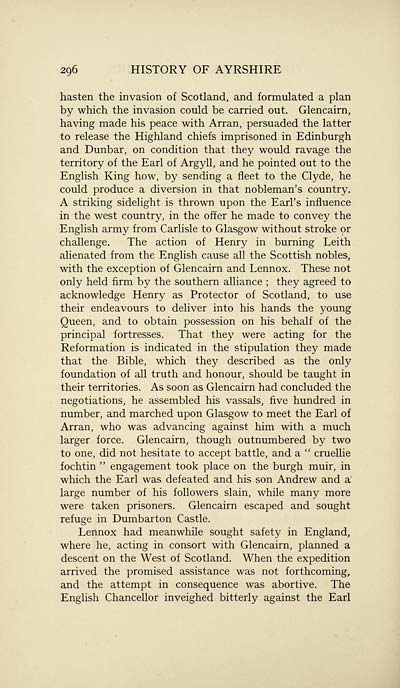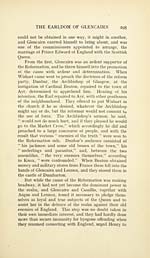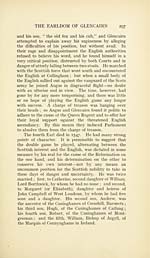Download files
Complete book:
Individual page:
Thumbnail gallery: Grid view | List view

296 HISTORY OF AYRSHIRE
hasten the invasion of Scotland, and formulated a plan
by which the invasion could be carried out. Glencairn,
having made his peace with Arran, persuaded the latter
to release the Highland chiefs imprisoned in Edinburgh
and Dunbar, on condition that they would ravage the
territory of the Earl of Argyll, and he pointed out to the
English King how, by sending a fleet to the Clyde, he
could produce a diversion in that nobleman's country.
A striking sidelight is thrown upon the Earl's influence
in the west country, in the offer he made to convey the
English army from Carlisle to Glasgow without stroke or
challenge. The action of Henry in burning Leith
alienated from the English cause all the Scottish nobles,
with the exception of Glencairn and Lennox. These not
only held firm by the southern alliance ; they agreed to
acknowledge Henry as Protector of Scotland, to use
their endeavours to deliver into his hands the young
Queen, and to obtain possession on his behalf of the
principal fortresses. That they were acting for the
Reformation is indicated in the stipulation they made
that the Bible, which they described as the only
foundation of all truth and honour, should be taught in
their territories. As soon as Glencairn had concluded the
negotiations, he assembled his vassals, five hundred in
number, and marched upon Glasgow to meet the Earl of
Arran, who was advancing against him with a much
larger force. Glencairn, though outnumbered by two
to one, did not hesitate to accept battle, and a " cruellie
fochtin " engagement took place on the burgh muir, in
which the Earl was defeated and his son Andrew and a
large number of his followers slain, while many more
were taken prisoners. Glencairn escaped and sought
refuge in Dumbarton Castle.
Lennox had meanwhile sought safety in England,
where he, acting in consort with Glencairn, planned a
descent on the West of Scotland. When the expedition
arrived the promised assistance was not forthcoming,
and the attempt in consequence was abortive. The
English Chancellor inveighed bitterly against the Earl
hasten the invasion of Scotland, and formulated a plan
by which the invasion could be carried out. Glencairn,
having made his peace with Arran, persuaded the latter
to release the Highland chiefs imprisoned in Edinburgh
and Dunbar, on condition that they would ravage the
territory of the Earl of Argyll, and he pointed out to the
English King how, by sending a fleet to the Clyde, he
could produce a diversion in that nobleman's country.
A striking sidelight is thrown upon the Earl's influence
in the west country, in the offer he made to convey the
English army from Carlisle to Glasgow without stroke or
challenge. The action of Henry in burning Leith
alienated from the English cause all the Scottish nobles,
with the exception of Glencairn and Lennox. These not
only held firm by the southern alliance ; they agreed to
acknowledge Henry as Protector of Scotland, to use
their endeavours to deliver into his hands the young
Queen, and to obtain possession on his behalf of the
principal fortresses. That they were acting for the
Reformation is indicated in the stipulation they made
that the Bible, which they described as the only
foundation of all truth and honour, should be taught in
their territories. As soon as Glencairn had concluded the
negotiations, he assembled his vassals, five hundred in
number, and marched upon Glasgow to meet the Earl of
Arran, who was advancing against him with a much
larger force. Glencairn, though outnumbered by two
to one, did not hesitate to accept battle, and a " cruellie
fochtin " engagement took place on the burgh muir, in
which the Earl was defeated and his son Andrew and a
large number of his followers slain, while many more
were taken prisoners. Glencairn escaped and sought
refuge in Dumbarton Castle.
Lennox had meanwhile sought safety in England,
where he, acting in consort with Glencairn, planned a
descent on the West of Scotland. When the expedition
arrived the promised assistance was not forthcoming,
and the attempt in consequence was abortive. The
English Chancellor inveighed bitterly against the Earl
Set display mode to:
![]() Universal Viewer |
Universal Viewer | ![]() Mirador |
Large image | Transcription
Mirador |
Large image | Transcription
Images and transcriptions on this page, including medium image downloads, may be used under the Creative Commons Attribution 4.0 International Licence unless otherwise stated. ![]()
| Histories of Scottish families > Ayrshire > Volume 2 > (306) Page 296 |
|---|
| Permanent URL | https://digital.nls.uk/95192770 |
|---|
| Attribution and copyright: |
|
|---|---|
| Description | A selection of almost 400 printed items relating to the history of Scottish families, mostly dating from the 19th and early 20th centuries. Includes memoirs, genealogies and clan histories, with a few produced by emigrant families. The earliest family history goes back to AD 916. |
|---|

